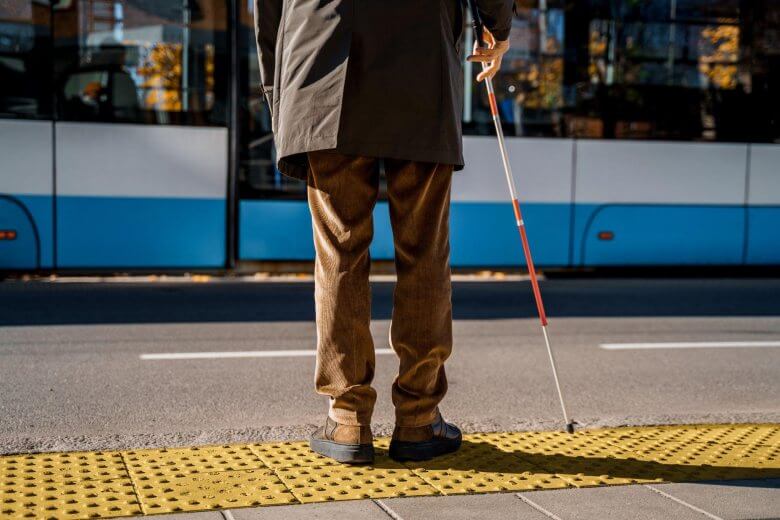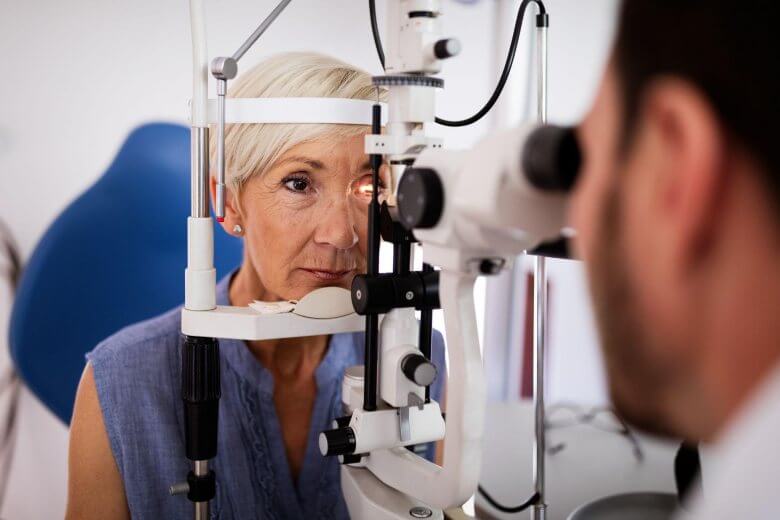Highlights
- Macular degeneration is a progressive eye disease that affects central vision, ultimately leading to vision loss.
- Symptoms of macular degeneration include blurred vision, seeing straight lines that appear wavy, blank or dark spots in vision, and a struggle to see objects in low light.
- Heart disease, diabetes, poor diet, age, and caucasian heritage may increase your risk of macular degeneration.
- Your eye doctor can perform several in-office tests to diagnose AMD, including the Amsler Grid test, optical coherence tomography, and routine eye exams.
- While there’s no cure for macular degeneration, treatments can help slow the progression.
Are you worried about the sudden changes in your vision, like straight lines appearing wavy or having difficulty seeing in low light? These could be symptoms of macular degeneration, a common eye disease. But don’t worry — early detection and treatment can help manage and slow its progression
Here’s what you should know about macular degeneration, including risk factors, complications, and treatment options.
What Is Macular Degeneration?

Macular degeneration is an eye disease that causes vision loss. This disease occurs when the macula (a part of your retina) becomes damaged.
The retina is essential for central vision, enabling your brain to interpret visual information. The macula is a small area within the retina, at the back of the eye, that helps you see fine details and colors.
When the macula becomes damaged, you can’t see objects in front of you as clearly, regardless of how close or far away an object is. However, your peripheral vision may remain intact; for example, you might be able to see the curtains on the stage wings but not the main performer.
There are two types of macular degeneration:
- Dry macular degeneration. Dry macular degeneration occurs when the macula becomes thinner over time and drusen deposits (small clumps of proteins) accumulate. This is the most common form of macular degeneration.
- Wet macular degeneration. Wet macular degeneration occurs when abnormal blood vessels grow under the retina and potentially leak fluid, which can lead to macular scarring. This is a less common but more serious form of macula degeneration.
You might also hear this condition referred to as age-related macular degeneration (AMD).
Macular Degeneration Symptoms
Symptoms of macular degeneration can vary by individual and the type of AMD you have. These symptoms may include but are not limited to:
- Straight lines that appear wavy. This visual distortion is often one of the earliest signs.
- Blurred vision. A gradual loss of clear, sharp vision in the center of your visual field.
- Struggling to see objects in low light. Difficulty with night vision or seeing in dimly lit environments.
- Blank or dark spots in your vision. These may appear in the center of your visual field.
- Changes in how you see color. Colors may appear less vibrant or more muted.
In the early stages, your peripheral vision typically remains unaffected, meaning you might still see objects out of the corner of your eye even as central vision deteriorates.
If you experience any of these symptoms or have other vision concerns, talk to your optometrist or ophthalmologist. They can conduct an eye exam and other diagnostic tests to determine if you have macular degeneration.
Macular Degeneration Causes
While genetics can play a role in the development of macular degeneration, the condition can develop with or without a family history. It occurs when the macula starts to deteriorate. Age is the strongest predictor of the disease.
While the exact cause of macular degeneration is largely unknown, researchers have found several risk factors that may increase your chances of developing this disease.
Macular Degeneration Risk Factors
You may be at risk of developing macular degeneration if one or more of the following apply.
- Age
- Diabetes
- High glycemic diet
- Genetics
- Smoking
- High cholesterol
- Heart disease
- Obesity
- Caucasian heritage
You can influence some of these risk factors. Eating a nutrient-rich diet, maintaining a healthy weight, quitting smoking, and exercising can all help to reduce your risk of developing macular degeneration.
Macular Degeneration Diagnosis

Your optometrist or ophthalmologist may perform a series of tests to diagnose macular degeneration. These include:
Routine eye exam
Your doctor may start with a simple eye exam, which includes dilating the eyes to get a better look inside. It’s important to get routine eye exams to spot potential problems early.
Amsler grid test
AMD can make straight lines appear wavy or affect how you see color. The Amsler grid tests for both of these symptoms. This grid consists of several horizontal and straight lines with a dot in the center. Your eye doctor may ask you to point out lines that appear blurry or wavy or areas that appear darker than others.
Optical coherence tomography
Optical coherence tomography (OCT) takes detailed images of the back of your eye for your doctor to review. This test is non-invasive and painless, just like getting your picture taken.
Fluorescein angiography
This test involves injecting a yellow dye (called fluorescein) into your arm and following it as it travels to the eye. This process allows your eye doctor to detect leakage under the macula.
Optical coherence tomography angiography
Optical coherence tomography angiography (OCTA) combines OCT and laser light reflection. OCTA creates 3D images of your eye’s blood flow to provide more detailed images compared to standard OCT.
Macular Degeneration Complications

If left untreated, macular degeneration can cause several complications, including the following:
- Central vision loss. AMD progressively worsens, which can affect how much you’re able to see.
- Legal blindness. Macular degeneration can lead to legal blindness and is a leading cause of irreversible blindness.
- Light sensitivity. Some individuals with AMD may be unable to tolerate bright light and may wear sunglasses even when indoors.
- Depression. A loss of vision and an inability to enjoy certain activities can lead to feelings of isolation and depression.
- Interference with daily activities. Normal life activities like driving a car, reading, or traveling may become more difficult.
Early detection is key to helping preserve your central vision for as long as possible.
Macular Degeneration Treatment
There is no known cure for either form of macular degeneration. However, certain treatments may slow the disease’s progression, allowing you to enjoy a higher quality of life for longer.
Treatment options include:
- Supplements. Nutritional supplements like zinc, vitamin C, vitamin E, lutein, copper, and zeaxanthin may slow the progression of AMD, according to the Age-Related Eye Disease Studies.
- Anti-VEGF injections. Anti-vascular endothelial growth factor injections like aflibercept or brolucizumab block the production of a protein that promotes new blood vessel growth, which may improve vision. This option is typically used for wet AMD.
- Photodynamic therapy. Your eye doctor may use a combination of a light-sensitive drug and a laser to remove extra blood vessels in the eye.
- Laser photocoagulation. This procedure involves a laser to seal leaking blood vessels.
Your eye doctor will choose treatments based on your specific type of AMD and its severity at the time of diagnosis. Remember that no treatment or medication is without risks and side effects, so speak with your doctor to weigh potential risks with benefits.
Macular Degeneration Prevention

Even with a healthy lifestyle and no family history of macular degeneration, you may develop this eye disease. You can reduce your risks by:
- Losing weight if you are obese or overweight
- Eating a diet rich in nutrients and antioxidants
- Exercising to maintain a healthy weight
- Quitting smoking
- Maintaining low cholesterol levels
- Keeping blood pressure under control
Take every opportunity to reduce the risk factors that are within your control.
Get the Lowest Price for Macular Degeneration Medications
If you’ve been diagnosed with macular degeneration and are taking medications or supplements, BidRx can help you get your prescriptions at affordable prices. Let pharmacies compete for your business. Simply create a bid, choose the offer that works best for you, and have your medications shipped directly to you. Depending on the offer you choose, you may also be able to pick up your prescription locally.
Find your macular degeneration medicines at BidRx. Visit our medication page to get started.
This information is intended for general informational purposes only. It is not a substitute for professional medical advice, diagnosis, or treatment. Always seek the advice of your physician or other qualified health provider with any questions you may have regarding a medical condition or medication.
